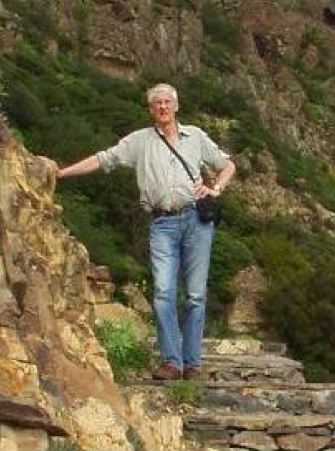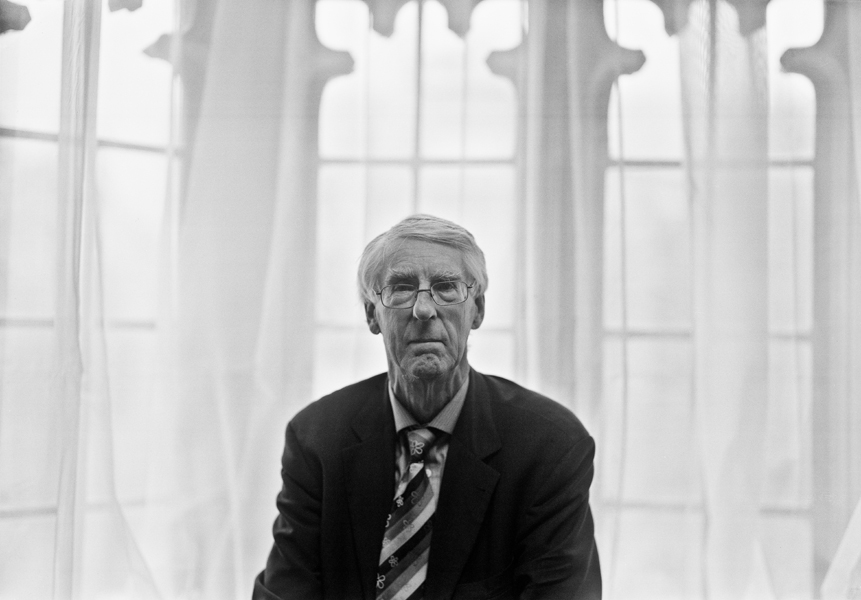LORD METHUEN, 1931-2014
Dr. Negley Harte, historian, Vice-Chairman of the Civic Society, writes:
Corsham has heard with sadness of the death of Lord Methuen, the Patron of the Corsham Civic Society. Robert Methuen was the 7th Baron Methuen and the first of his line not to live at Corsham Court. He died in Derbyshire soon before his 83rd birthday on the 9th July 2014; he was born in Corsham on the 22nd July 1931.
The Methuens traced their origins to the wolves of Hungary and other romantic beasts among the nobility of Scotland, but they first became known in Wiltshire as making their fortune in the fine cloth industry of Bradford-on-Avon in the late seventeenth century. In 1745 the wealthy young Paul Methuen of the day decided to buy the Corsham Court estate in order to set himself up as a gentleman and shake the dust of commerce off his feet.

Lord Methuen 1931-2014
He was very successful in this task. He soon had Corsham Court greatly expanded to include the important art collection built up by his famous kinsman. The Methuen famously memorialised in the Methuen Treaty of 1703 with Portugal left the art collection he had built up to his cousin, and Capability Brown was engaged to extend the house to provide for the notable collection. Port replaced claret, and Corsham came unexpectedly to have a major art collection.
The extensive cloth industry premises were sold off, and many other properties in the rest of Corsham were bought. Another major collection of art arrived and was incorporated. In 1806, the Red Lion on the old London to Bath coaching road was rebuilt and renamed the Methuen Arms. The Methuens had come to own most of Corsham. The Methuens became well established as gentlemen on a notable scale, MPs and so forth, and in the coronation honours list of the new Queen Victoria in 1838 the then Paul Methuen was raised to the peerage as the first Lord Methuen.
The 3rd Baron was a famous Field Marshall (d. 1932) and his son the 4th Baron became a famous artist (d. 1974). It was through his connections that the Bath Academy of Art, bombed out of Bath, came to be settled at Corsham Court after the war. The childless 4th Baron was briefly succeeded by his architect brother, who became the 5th Baron for barely eighteen months in 1974-75. His eldest son John succeeded as the 6th Baron. John Methuen was well-known and well-liked in Corsham, where for some years he was a member of the Town Council. He is remembered for drinking lunch in the Methuen Arms, and walking back afterwards down the High Street, greeting all the citizens by name and inviting some of them back to the Court for another drink. He gave memorable parties.
When John Methuen died, unmarried, in 1994, his brother Robert became the 7th Baron. He had quite a different personality; he was quiet, serious, modest, unshowy, an engineer by profession. He was educated at Shrewsbury, a public school well-known for engendering clever irreverence, and after national service in the Royal Signals, at the intellectually grand Trinity College, Cambridge, where he read the unaristocratic subject of engineering, graduating in 1957.
His schooling did not make him given to irreverence, nor did his college make him an intellectual. Robert Methuen became a working engineer. He was first a design engineer for Westinghouse Brake and Signal Co. in Chippenham for the ten years after he graduated, then he had seven years at IBM as a computer systems engineer, and then in 1975 he went to work for Rolls-Royce in Derbyshire. He was just retiring from Rolls-Royce in 1994 when by extraordinary coincidence, as he admitted himself, his brother died and he himself became the 7th Lord Methuen and a member of the House of Lords – the ideal retirement job.

Lord Methuen
Robert Methuen had married in 1958 and had had two daughters, neither of whom was eligible to inherit either the title or the settled estate in Corsham. He chose therefore to remain in Derbyshire, and commute to London for a few days every week when Parliament was sitting to take his place in the House of Lords. Moreover he had divorced his wife, known and liked in Corsham, in 1993, and married a Viennese lady who was quite unknown in Corsham. They remained happily married. During his final illness he was visited frequently by his first wife. After 1994 his cousin, James Methuen-Campbell, took up his place as lord of the manor in Corsham.
Robert Methuen took his duties in the Lords seriously, rarely speaking, but assiduously sitting on many committees, not just the Science and Technology Committee. ‘They must have been glad to have an engineer in the House’, I said to him on one occasion; ‘well’, he said, calmly, ‘there are four of us’. He was regarded as so steady a member of the Lords that after most hereditary peers were excluded after the House of Lords Act in 1999, he was elected as one of the 90 hereditaries who were retained. He was one of four such peers taking the Liberal Democrat whip. He was astonished to find himself on the government benches after 2010 when the coalition government came in.
He was a healthy active man, never ill until fatally so for a few weeks before he died. Members of the Civic Society will remember him coming to speak to us in the Pound Arts Centre a couple of years ago about the work of the House of Lords. He spoke carefully and sensibly and intelligently about that strangely constituted but remarkably useful institution.

Corsham Court
He leaves his widow and the two daughters of his first marriage, the second of these having herself three daughters. Robert Methuen had the satisfaction of grand-daughters, but not of heirs who could succeed. He is survived too by his sister, the Hon. Mrs Elizabeth Fraser, who lives in Corsham.
James Methuen-Campbell becomes the 8th Baron Methuen, after a knight’s jump in the chess of succession. He is the grandson of the brother of the artist Lord Methuen, the 4th Baron. He has been resident in Corsham, running the estate since 1994, and is well-known and liked in the town, despite his quiet and retiring manner. He is a highly regarded music critic and author and keeps careful tabs on what is happening in Corsham. He wishes it known that he will not be using the title.
